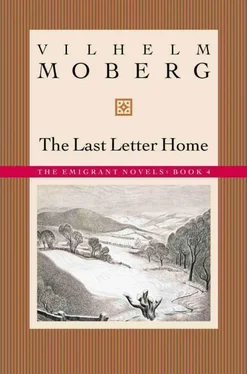The singing and the music poured out through the open church windows. Outside the leafy elms swayed, there grew the spring blossoms, fragrant roses, tender lilies. The ground itself was potent with green grass and herbs, and a young and green summer soughed in the elm crowns above the earth.
And inside the church the wedding; the new bridal crown is worn for the first time, shown to the congregation. It is a gift from an unknown donor in the New World. Reverently the young bridal couple moves up the aisle. On the brides head rises the silver crown with its precious stones glittering like stars and crystals. The couple kneels at the altar, the congregation rises. As the wedding march dies only the soughing in the elms can be heard from outside.
Then the voice of the minister — the ceremony has begun.
All the people in the pews have their eyes on the beautiful crown. But who is the bride?
The former Ulrika of Västergöhl sits with eyes closed, in deep thought. She has closed her eyes in order to see. And she sees. She does not see Karl Oskar who is sitting in front of her, or the furniture and knickknacks in her comfortable home in Stillwater, nothing of her surroundings. Under her closed eyelids she sees a bride at the altar in Ljuder church at Whitsuntide. She has recognized her. She has recognized not only the crown, which she herself has bought and held in her hands, she also knows the young bride — her body, her features: It is none other than she herself. It is Ulrika herself who wears the silver crown with the precious stones.
Everyone in the church can see that the bride at the altar is beautiful, her cheeks blooming pink from modesty, her eyes radiating health, happiness. She stands straight and proud, her bosom high under the bridal blouse. She is without a doubt the most attractive girl in the parish, and more beautiful than ever in her white gown. Who could have been more suitable to consecrate the crown? The whole congregation can see the young girl, the virgin, the church bride, a chaste young woman married in her home parish at Whitsuntide — Ulrika as a young bride!
The former parish whore, excluded from church and altar in her home parish, had been the first Swedish bride in the St. Croix Valley. But her innermost, secret dream had been from early years to be a bride in her home church. It was her great desire, for a life different from the one she had lived, and she could never smother it.
Now her dream has come true, in the guise of another woman; she has exacted payment for the life she had been denied. Every time a young bride wears her crown in Ljuder church, Ulrika is indemnified.
For each virgin bride in the home village church is she. Other women have a wedding only once in life, but she will celebrate it many times. Again and again she will be dressed and decked and see herself in the dream she has always nourished in secret. At each church wedding she will be resurrected from her youthful degradation as her head again and again carries the crown with the precious stones.
Mrs. Henry O. Jackson, sitting here in her home in Stillwater, is not young any more. She who with closed eyes views the June wedding in her homeland will soon be a woman of many years. Soon her cheeks will be flabby, the wrinkles spreading, and the legs under her heavy body unsteady. But she can sit and dream in this joyful knowledge: Even after her death she will stand as bride in Ljuder church, year in, year out.
Ulrika of Västergöhl has finally been vindicated in Sweden. She has been turned into the eternal crown-bride.
XXII. THE FARMER AND THE OAK
— 1—
Strong, well-muscled young men were growing up at Lake Chisago’s oldest settlement. Four sons had grown into men. Two were as tall as the father, two taller. Any one of them could manage a job requiring a full-grown man. All were broad across the shoulders, strong in limbs, keen and handy. Their growth into manhood was the greatest change that had taken place at this settlement.
Karl Oskar retained a father’s authority over his sons; this must remain his as long as they ate his bread and lived in his house. But the older they grew the less he knew about them. He was together with his boys in work, but outside the home they lived their own lives. He was the hermit, seldom away from home, they were lively, often away, associating with other people. And father and sons already used different languages when they spoke with each other. The children more and more discarded their mother tongue for English — when he addressed them in Swedish they would reply in English. This seemed awkward to him and plainly askew. At first he tried to correct them, but by and by he became accustomed to it and after some time it no longer bothered him. There was nothing he could do about it, so perhaps it was better to say nothing. After all, his children were right; he must not hinder them from speaking their country’s language. In the settlements hereabouts Swedish was all right, but outside the Chisago Lake district they had little use for their mother tongue. The surer they became in English, the easier would be their success in this country.
Karl Oskar’s children were to be saved from the language difficulties he had gone through in America. How hadn’t it hindered him! How many humiliations hadn’t he endured because he couldn’t speak the country’s language. At last he managed, but like other Swedes at Chisago Lake he used his own brand of English, strongly mixed with the old language. He would never learn anything else. Lately he more and more forgot the new since he seldom went beyond his farm, and he fell back on Swedish.
He felt that his children, when outsiders were present, were ashamed of their father’s way of speaking. The children didn’t understand, couldn’t understand, how much easier it was for them. All he could do was to pretend he didn’t know they were ashamed of their father’s expressions.
With the growing children, the new language came into the house and expelled the old. It didn’t even spare the name their home had had from the beginning. Karl Oskar’s children no longer called their home New Duvemåla. They had given it another name, a name used by people who spoke of the first settlement at Chisago Lake. New Duvemåla was no more, it was gone and would never be revived. Instead it was now called the Nilsson Settlement.
— 2—
The oak grove to the east of the house still stood, covering about twenty acres of fertile land where crops could grow. For ten years Karl Oskar had had his eye on this piece of ground. Then a mild, suitable autumn arrived which was to be the grove’s last; the days of the mighty oaks were numbered.
It had taken the farmer a long time to plan his attack on the oaks; this fall the plan was completed, now he had thought it over long enough. He had figured out how to go about it, how to turn this ground into a tilled field: The giant trees would be pulled up by the roots.
Now with the boys he had sufficient help, and Karl Oskar Nilsson and his four sons approached the grove with their team one early morning. Five men and two horses — the combined strength of men and beasts would fell the old oaks.
They began with one of the largest; they dug a ditch around the tree, four feet deep, and cut the roots. They took away the foothold of the oak. This was the trick to conquer it: Deprive it of its hold. They began down at the root; when the ditch was ready two of the boys climbed up the tree with a heavy iron chain, as high as they could get. They fastened it to the trunk and the father joined it to the pull lines from the team.
Human labor had done its part, now it was the turn of the beasts; the horses would fell the tree. But the oak itself would help, its weight would facilitate its fall.
Читать дальше












